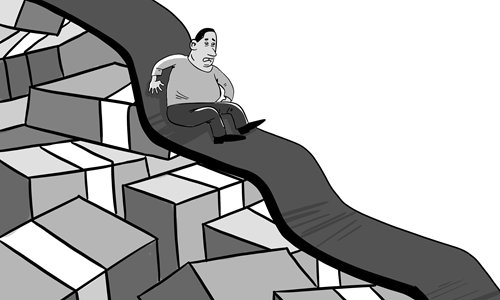HOME >> BUSINESS
Retail ‘market downgrade’ sends alarm signals amid increased e-commerce monopoly
Source:Global Times Published: 2019/7/7 20:38:44

Illustration: Luo Xuan/GT
Talk of a so-called "consumption downgrade" has emerged in China in recent years. It refers to a shift of consumer preference from luxury products to cheaper goods amid the economic slowdown. Chinese officials have generally denied such a phenomenon, but even if China is really undergoing a "consumption downgrade," cutting down spending on luxury goods is just a normal response by people when facing a slowing economy.
However, in our opinion, what is more alarming than the "consumption downgrade" is the "market downgrade" in China. Different from the "consumption downgrade," the "market downgrade" is mainly reflected in the following ways.
First, China's consumption market has seen the withdrawal of foreign investment. For example, Japanese department store chain Takashimaya recently announced that it will close its flagship store in Shanghai and withdraw from the Chinese market. According to a notice from its Shanghai store, since it is difficult to turn the business around due to factors like unexpected changes in consumption structure, fierce competition, and sluggish sales at physical stores, the company decided to close the Shanghai store on August 25.
In the meantime, Walmart shut down another superstore in Zibo, East China's Shandong Province, the 15th store Walmart has closed in China since the beginning of this year. As a result, the US retailer now only has one superstore in Shandong Province. On June 23, Carrefour, Europe's largest retailer, took the decisive step to withdraw from China. The French retail group announced that it had agreed to sell 80 percent of its Chinese operations to Chinese group Suning.com in an all-cash transaction.
While there are various reasons for the withdrawal of foreign companies from China's retail industry, such developments may cause reduced diversity, downgraded brands and even a decline in product quality. The Chinese consumption market could also lose its vitality due to declining diversity.
Second, the rapid development of online retailers has hit the domestic retail market hard. E-commerce has been developing by leaps and bounds in China. According to statistics from the China International Big Data Industry Expo 2019, China's e-commerce trade volume jumped from 3.14 trillion yuan ($455 billion) in 2008 to 31.63 trillion yuan in 2018, with online retail sales soaring to over 9 trillion yuan from 130 billion yuan during the same period. Such rapid growth of online sales has had a big impact on brick-and-mortar retailers, resulting in the collapse of many department stores in recent years.
In February, Chinese conglomerate Dalian Wanda sold its 37 department stores to e-commerce giant Suning.com. What's even more awkward is that department stores have become a "fitting room" for online retailers as customers often place orders online after trying on at physical stores. Online retailers beat physical stores with lower costs, which can be seen as a kind of market competition. But the collapse of physical stores will lead to business depression in the high street.
Third, e-commerce giants have become increasingly monopolistic in the retail market. Against the backdrop of excessive capital, e-commerce companies are able to achieve rapid expansion in a short period of time with the power of capital, leading to the rise of internet giants like Alibaba, JD.com, and Pingduoduo, which have almost monopolized the domestic market. Such a monopoly could see easy circulation of inferior products, which also complicates regulatory supervision.
According to data from an e-commerce dispute mediation platform, the number of complaints received in 2018 rose 38.36 percent year-on-year, of which domestic online shopping made up the bulk, accounting for 55.19 percent of all complaints received last year.
Fourth, consumers have to face the "consumption downgrade." In recent years, authorities from all levels have given strong support to the development of e-commerce. It is with backing from government policies and excessive capital that the e-commerce sector has undergone fast growth.
After taking an almost monopolistic position in the domestic market, e-commerce giants can easily transfer the rising costs pressure to consumers. And consumers will have no choice but to purchase those products with high prices and low quality, which could be seen as another form of "consumption downgrade."
To sum up, the Chinese market is facing the risk of being "downgraded" amid the withdrawal of foreign investment and the increased monopoly by e-commerce giants, which will not only lead to business depression, but also cause the "consumption downgrade."
The article was compiled based on a report by Beijing-based private strategic think tank Anbound. bizopinion@globaltimes.com.cn
Posted in: EXPERT ASSESSMENT